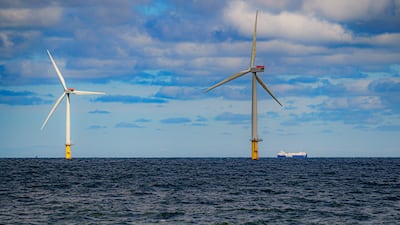Investment from the private sector of the order of £100 billion is required to drive forward key projects that will safeguard the UK's energy security, according to a new report from the offshore energies industry.
The Offshore Energies UK's 2023 Economic Report said the funding is also needed to get the renewables infrastructure that will take the UK to net zero by 2050 up and running as soon as possible.
The report said total offshore energy spend could reach £200 billion ($251.5 billion) by 2030, with the focus on oil and gas, offshore wind, carbon capture and storage and low carbon hydrogen.
According to the report, half of that money is ready to go, but businesses need confidence that the regulatory and policy frameworks are in place before giving final sign-offs.
Offshore Energies UK (OEUK) points out that the £100 billion will be unlocked only once government policy gives the industry its unequivocal support through a stable and globally competitive tax regime and improved planning and regulatory timelines.
Energy security and the UK jobs that will be created on the path to net zero need to be protected from the turbulence that often emerges in the political arena, certainly in the run-up to elections, OEUK said.
"Parliaments may thrive on opposition and argument, but we know big engineering projects only succeed through collaboration," said David Whitehouse, chief executive of OEUK.
"The transition to net zero will be the biggest engineering project this country has ever seen. We need consensus to support the very industries and workers whose skills are vital for building our energy future.
"In recent months we have felt the direct impact of underinvestment in homegrown energy on job security for our workers, the competitiveness of our firms internationally and our future energy bills.
"Our report shows that with the right frameworks in place, this industry can make the long-term investments to help the UK tackle these challenges head on.
"The UK mustn't just become a good place to do energy business, it must become irresistible," he added.
Unions, meanwhile, have said that while investment is crucial, it all has to be linked with the workers who will actually make the net-zero projects a reality.
“Offshore energy is essential now and as part of a green future for the UK. But we can only get net zero through a worker-led transition," said Sharon Graham, general secretary of Unite.
"Government support and incentives must be linked to collective bargaining and guaranteed jobs, pay and conditions for all the many thousands of workers in offshore energy and supporting industries.
“We cannot have a repeat of the devastation wrought on workers and their communities by the closure of the coal mines.”

'Low levels of expected investment'
There have been recent warnings that the UK is at risk of lagging behind when it comes to green energy investment and production, despite being a global leader in energy transition in recent years.
Last month, a report by Energy UK, said the UK was suffering from relatively "low levels of expected investment" compared in particular with the United States, which passed the Inflation Reduction Act last year, pledging $370 billion for energy transition.
Meanwhile, the European Union stepped up its own tax reduction and incentive measures for investments in net-zero projects.
On Tuesday, the UK government's Energy Bill began its final journey through the House of Commons, with an amendment that eases the de facto ban on onshore wind in England that was added following pressure from environmental campaigners and some Conservative politicians.


